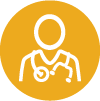Most cancer treatment includes chemotherapy, a process that delivers strong drugs to your body to kill cancerous cells. You receive these drugs at regular intervals and for a specified length of time.
Your doctor at UHC Cancer Center may recommend oral or IV chemotherapy based on your specific type of cancer, its progression, and your personal preferences. Both have equal strength and deliver similar results.
What is Oral Chemotherapy?
Oral chemotherapy consists of a liquid or a pill that you swallow. You do not receive any injections, and you can complete your treatment at home. However, taking the pill or liquid exactly as directed is essential to kill the cancer. While this method is more convenient for patients, it is also more expensive. Your health insurance company may require you to pay a higher deductible or co-payment than you would have to for intravenous chemotherapy.
Before your doctor sends you home with oral chemotherapy, he or she will go over the following:
- Usage instructions, including how often and how much to take and whether you can take it with food, vitamins, supplements, or other medication
- What to do if you have difficulty swallowing the pill or liquid
- How to store the medication
- What to do if you miss a dose
- How often you need to come to UHC Cancer Center in person while taking oral chemotherapy
- How oral chemotherapy may interact with other medications or affect other health conditions
It is important to understand the purpose of oral chemotherapy is to keep the same level of drug in your body throughout treatment so it can effectively kill cancer cells. If you routinely miss doses or don’t take it according to your doctor’s instructions, the cancer cells could grow instead. You may need a dosage change at some point in your treatment, but this is something for your doctor to decide. You should not change how or when you take the medication without consulting him or her.
Potential Side Effects of Oral Chemotherapy
Oral chemotherapy travels through your entire body to kill cancer cells. This means that it also harms healthy cells and causes side effects.
Some of the side effects you may experience include:
- Nausea
- Vomiting
- Diarrhea
- Mouth sores
- Hair loss
- Low blood counts
- Skin changes
What is IV Chemotherapy?
For intravenous (IV) chemotherapy, you need to come to UHC Cancer Center and receive cancer-killing drugs through a plastic tube placed into your veins. Like oral chemotherapy, IV chemotherapy takes place according to a pre-determined schedule. Some patients have a port embedded in their skin prior to their first session. A port is a plastic or round metal disc that holds your IV during treatment. The benefit of port placement is that a nurse doesn’t have to locate a vein to place the needle at the start of each IV chemotherapy session.
Before your first appointment, you need to meet with the healthcare team who will provide your chemotherapy.
Your doctor or nurse will complete the following:
- A physical exam
- Record your blood pressure, breathing rate, pulse, and temperature
- Record your height and weight to determine the appropriate dose of chemotherapy
- Take a blood sample
- Place an IV tube in your arm
You will also meet with an oncologist who will order the chemotherapy after checking the results of your exam.
After an IV Chemotherapy Session
Once you have received all medication for the day, your nurse disconnects your IV line. IV chemotherapy can produce the same side effects as oral chemotherapy. You may wish to have someone accompany you to each appointment and drive you home. Not only does this provide important moral support, but you may also have drowsiness that can affect your ability to drive yourself.
If not contraindicated, we recommend drinking a lot of fluids for the first 48 hours after chemotherapy to help the drugs move through your body. It is important to avoid crowds and being around sick people while undergoing either type of chemotherapy due to your weakened immune system.
Be sure to contact us with any questions or concerns during chemotherapy, no matter which type you receive.
Please note, the information provided throughout this site is not intended or implied to be a substitute for professional medical advice, diagnosis or treatment. All content, including text, graphics, images, and video, on or available through this website is for general information purposes only. If you are experiencing related symptoms, please visit your doctor or call 9-1-1 in an emergency.

